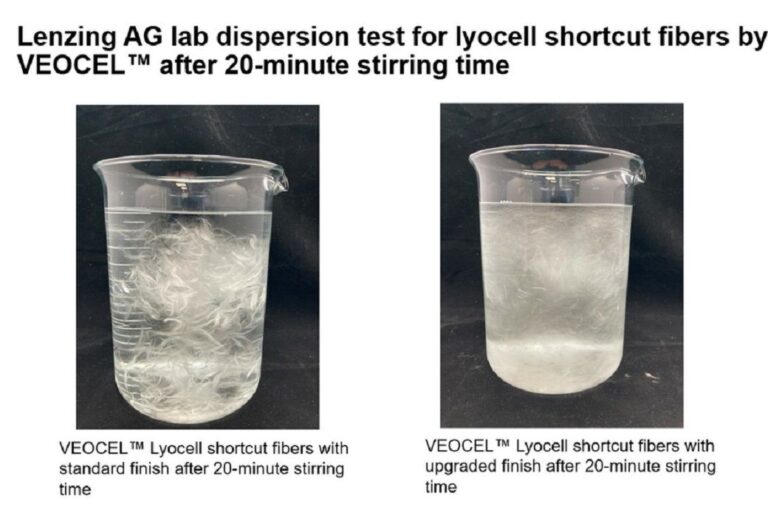
[ad_1]
The fibres are also offered as carbon neutral, thus contributing to a global push to reduce the industry’s carbon footprint, Lenzing Group said in a press release.
Lenzing Group’s Veocel brand has launched upgraded lyocell shortcut fibres that are highly dispersible, improve machine efficiency, and contribute to reduced occurrence of mechanical blockages and product defects.
The wood-based lyocell shortcut fibres are offered as carbon neutral, helping to drive the flushable wipes market towards decarbonisation.
The new finish of the upgraded lyocell shortcut fibres offers protection against mechanical stress at commonly used water temperatures such as 0 degrees Celsius to 40 degrees Celsius during the wetlaid production process. This helps to avoid the creation of fibre lumps during the opening and dilution of fibres in preparation tanks. The finished product will also have enhanced physical quality and appearance thanks to the upgraded finish which improves web formation during the process.
Albaad, one of the largest wet wipe manufacturers in the world, used the new lyocell shortcut fibres for its Hydrofine product, the most saleable flushable wetlaid in Europe.
More and more consumers are using flushable wipes for greater convenience and lower impact on the environment. In 2022, the global nonwoven wipes market consumed 1.5 million tons nonwovens, valued at $20.8 billion, and is expected to reach 2.1 million tons, valued at $29 billion in 2027. As consumers continue to look for products made of natural materials, it is important to distinguish between flushable wipes made of wood-based fibres and wipes made of fossil-based fibres, such as polyester or polypropylene which take decades to disintegrate and contribute to the global micro plastic problem.
Flushable wipes, which are made of lyocell shortcut fibres by Veocel with improved finish and are produced with adequate settings of the Roll Good Manufacturer, can disperse and degrade to meet current flushability guidelines as proven by mechanical disintegration and biodisintegration tests done at Lenzing R&D Center and the International Water Services Flushability Group (IWSFG) specifications.
The new and improved carbon neutral lyocell shortcut fibres by Veocel can be purchased from Lenzing’s production site in Mobile, Alabama, the release added.
“We’re always looking for new ways to innovate and improve the performance of our fibres in the flushable market,” said Claudio Zampino, commercial director, specialty applications for global nonwovens business at Lenzing. “It is important to engage in continuous discussions with value chain partners to address their challenges and needs as we drive innovation in the nonwovens sector. With 27 years of experience producing lyocell shortcut fibres, we will continue to keep leveraging our extensive research labs to offer customers the best premium lyocell shortcut fibres possible.”
“We are proud to cooperate with the global Lenzing group in developing improvements for lyocell fibres and bringing new innovation that enhances our Hydrofine product and improves the production process. Our unique Hydrofine product, which is considered a breakthrough in the flushable market, is based on these upgraded fibres that help to increase production efficiency, reduce the level of waste, and improve customer satisfaction. Collaborating with Lenzing’s R&D team was a valuable experience that provided both sides with great knowledge. Albaad is committed to innovation, to reduce the industry’s carbon footprint, and to ensure ensuring continued improvement of our products’ performance,” said Jacob Heen, CEO of Albaad.
Fibre2Fashion News Desk (DP)
[ad_2]
Source link